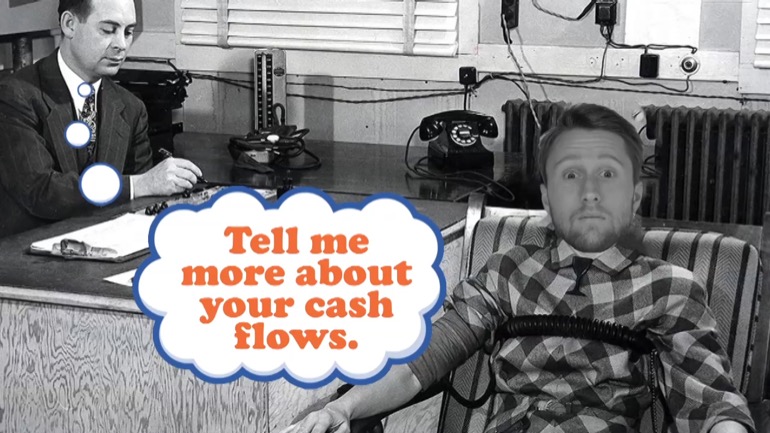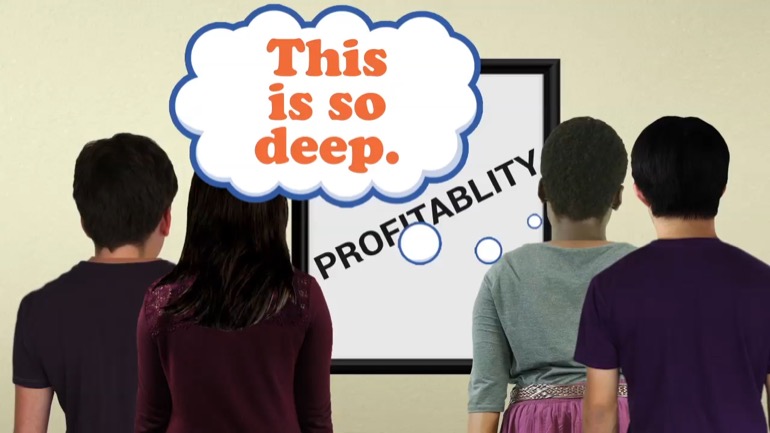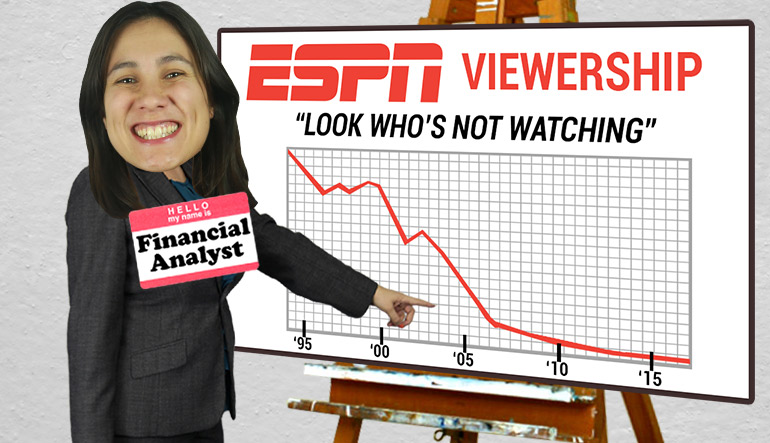ShmoopTube
Where Monty Python meets your 10th grade teacher.
Search Thousands of Shmoop Videos
Principles of Finance Videos 166 videos
How is a company... born? Can it be performed via C-section? Is there a midwife present? Do its parents get in a fight over what to name it? In thi...
Company Formation, Structure, and Inception: Unit Intro. Sorry, Leo DiCaprio fans—we're not going to be breaking down the plot of Inception. We'r...
Okay, so you want to be a company financial manager. It's basically up to you to make money for the shareholders. It would also be swell if you mad...
Principles of Finance: Unit 4, Appropriate Debt Levels 5 Views
Share It!
Description:
What are appropriate debt ratios? Are those just debt ratios that don't wear jean shorts to the opera?
Transcript
- 00:00
principles of finance a la shmoop. appropriate debt ratios. so let's start
- 00:07
out this little story asking why a company would take on debt in the first [man makes presentation with white board]
- 00:11
place? now let's say a company could buy a
- 00:13
competitor who is struggling to survive for twenty million bucks and put that
- 00:17
competitor's product onto the company sales and distribution platform and in
Full Transcript
- 00:22
the first year of owning that target take a company that was fairly breakeven
- 00:27
and in year one have profits of eight million bucks. after you know firing
- 00:31
everyone from the competitor company and that was just acquired. in year two the
- 00:34
company that makes twelve million dollars in profit basically earning back
- 00:38
all of the money it borrowed to buy that competitor. was that a good deal? well
- 00:43
absolutely. and companies take on debt all the time to make what is called
- 00:47
strategic accretive acquisitions just like this. they borrow money to do the
- 00:52
acquisition because well they probably didn't have the cash to begin with, and
- 00:56
they didn't want to use their own stock because they didn't want to suffer
- 01:00
dilution in the process. the debt capital allowed the company to expand and grow
- 01:04
faster than it would have had it remained unleveraged. so that begs the
- 01:09
question, how much debt can a company borrow? like what's the appropriate level [cash pictured]
- 01:14
and how do you even think about that question? well let's start with some
- 01:17
frames that paint out companies who can and maybe should borrow a lot of money,
- 01:21
and those who should not. all right well the truth is that economic cyclic ality
- 01:25
determines borrowing rationale. you've probably heard of the cycle or at least
- 01:30
the economic cycle or at least cyclic ality. none of those ?crickets? okay all
- 01:35
right and let's go back. well most of the world's economies operate in regular
- 01:38
mini boom and bust cycles. the stock market typically leads this cycle or
- 01:43
said the other way around the economy lags the stock market. why? well because
- 01:47
stock market prognosticators investors and other gadflies spent all day staring
- 01:52
at data and talking with other gadflies about what they all see in their crystal
- 01:57
balls. well they're the Canaries in the mine shaft these gadflies they try to
- 02:01
look into the future because they get massively paid if they are accurate in
- 02:05
their predictions by putting their or their investors money
- 02:09
where their mouths are. and they look for patterns. well roughly every seven or [crystal ball says "invest now"]
- 02:13
eight years we tend to have a boom and a bust cycle from 1981-82 to the late 80s
- 02:18
we had a big bull market and bull economy and then the junk bond scandal
- 02:22
kind of killed things or about two years market recover and then from late 1992
- 02:25
until late 99 early 2000 we the greatest bull market in history, thank you very
- 02:30
much Yahoo and all those people, then things blew up for about two years and
- 02:34
the market bottomed late 2002 and the county and oh three and recovered it in
- 02:38
two oh seven oh eight, when it blew up again big time in the mortgage crisis
- 02:42
which bottom then mid oh nine and fund the markets been on a tear after that
- 02:46
for a decade. better check your calendar. yeah so any blip on the radar from a
- 02:51
bomb going off in the middle east to a sign of fraud to a sign of structural
- 02:55
weakness like the student loan crisis, we're all nervous about these days will
- 02:59
send a mini panic to the people who invest in the stock market they pull
- 03:03
their money the market Falls until it reaches a level where growth investors
- 03:06
have all left all the optimists are gone and the value investors have now stepped [growth investor defined]
- 03:11
in because the fundamental risk reward ratio now looks favorable for a dollar
- 03:15
invested today paying more than a dollar in the next no year change.
- 03:19
so back to company debt levels if you are a highly cyclical company can you
- 03:25
afford a lot of debt ? no absolutely not. if your only business is selling washing
- 03:32
machines you're gonna have very few people upgrading in bad economies.
- 03:36
they'll just repair their old ones and make them last two more years instead. in
- 03:41
those bad years it's likely you go from operating profits of 20 percent to
- 03:45
operating losses of like 10 percent meaning of revenues. something like that
- 03:49
anyway if you then stacked a bunch of debt on top of that well you'd risk
- 03:53
bankruptcy in the bad times and be well pretty much dead. click on our IP. so that
- 03:59
was washing machines. highly cyclical business cannot afford a lot of debt. but [massive washing machine pictured]
- 04:04
what about cable television? well most people in America would rather starve or
- 04:08
at least live on ramen noodles, than have their Game of Thrones and Internet
- 04:12
connectivity turned off right? so in boom times the cable industry you know
- 04:16
doesn't grow much faster than it does in bad times.
- 04:19
doesn't whither. and the cable industry is a non cyclical business and is appropriate
- 04:24
for a lot of debt. and historically yeah the cable industry has taken on massive
- 04:28
amounts of debt. so note the myriad strategic options that having access to
- 04:32
debt capital affords companies. lots of great reasons to have the option of a
- 04:37
bunch of debt when the great opportunities arise. all right well if
- 04:40
the company has lots capital at its disposal it can build better product and
- 04:44
more efficient factories, tastier treats, quicker better delivery to customers, it
- 04:48
can also buy competitors cut costs, and raise prices. or saving any of those
- 04:53
strategic options it can take out debt, to just buy back its own stock. that way
- 04:57
when you want to scream at the idiot who's running the company the one [woman glares at self in mirror]
- 05:00
responsible for selling you the friggin shares, that you just bought back, well
- 05:05
you know then all you need to do is find a mirror. so all debt is not bad. all
- 05:09
right well what's an appropriate debt level? yeah well there are really two
- 05:13
drivers of appropriateness so when it comes to debt levels and both are framed
- 05:17
in the revenue and margin structure of the company, all right backing up. the
- 05:21
general idea is that you have a lot of revenue and high margins say a billion
- 05:26
dollars in cash profits each year, well then can you afford a billion dollars of
- 05:30
debt? almost certainly. can you afford 10 billion of debt?
- 05:33
well almost certainly not. [10 billion in debt crossed out]
Related Videos
GED Social Studies 1.1 Civics and Government
What is bankruptcy? Deadbeats who can't pay their bills declare bankruptcy. Either they borrowed too much money, or the business fell apart. They t...
What's a dividend? At will, the board of directors can pay a dividend on common stock. Usually, that payout is some percentage less than 100 of ear...
How are risk and reward related? Take more risk, expect more reward. A lottery ticket might be worth a billion dollars, but if the odds are one in...







































































































